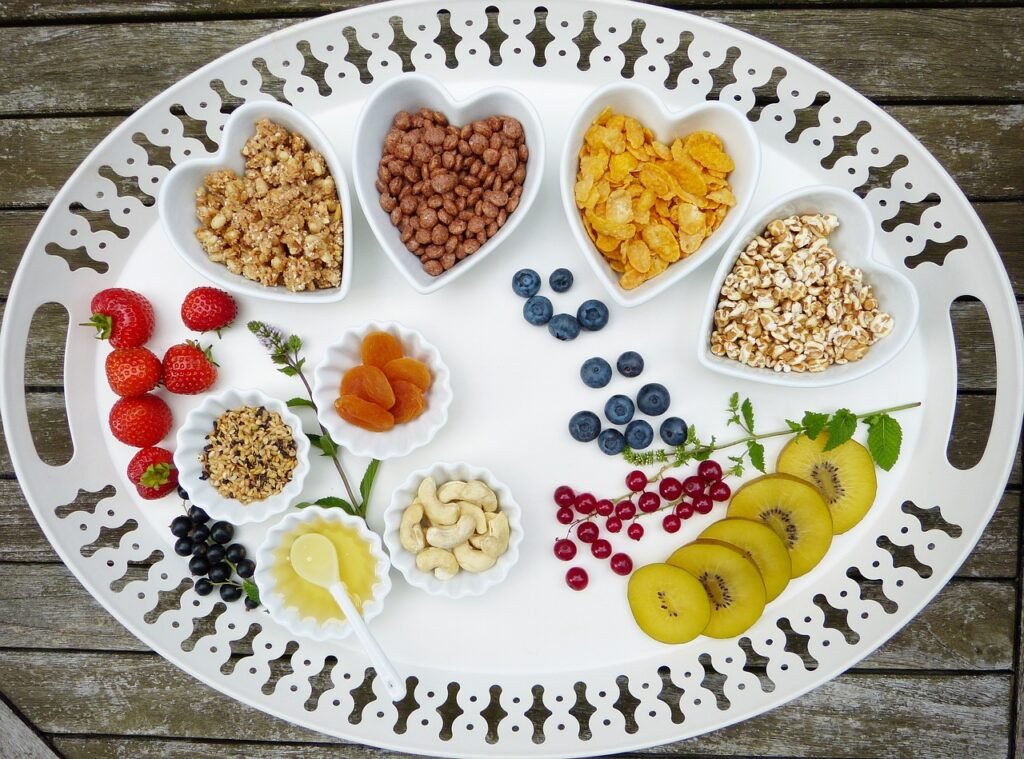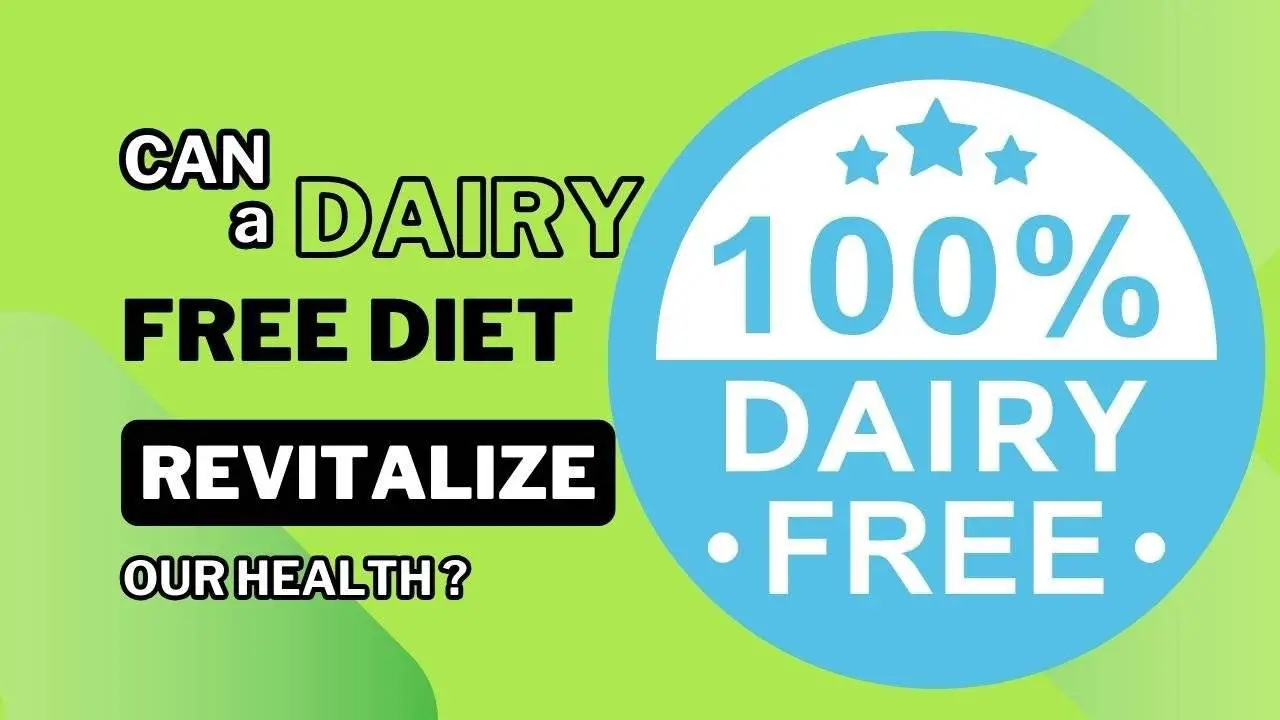
A dairy-free diet can improve skin health and reduce bloating by eliminating dairy products. Incorporating calcium, protein, and vitamin D-rich foods is essential for bone health when avoiding dairy.
Making the switch to a dairy-free lifestyle not only offers health benefits like weight loss and reduced inflammation, but it also promotes environmental sustainability and animal welfare. By making conscious dietary choices, individuals can revitalize their health while contributing to a more compassionate and eco-friendly world.
Introduction To Dairy-free Living
Embarking on a dairy-free lifestyle may offer a revitalizing impact on our health. By eliminating dairy, we can potentially improve skin health, reduce inflammation, and support gut health. Making nutritious substitutions can make dairy-free living a healthy and stress-free choice.
Motivations Behind Adopting A Dairy-free Diet
Some people choose a dairy-free diet due to lactose intolerance, allergies, ethical concerns, or a desire to improve their health.
Many individuals report feeling less bloated and experiencing clearer skin after eliminating dairy from their diet.
For those with lactose intolerance, a dairy-free diet can alleviate symptoms such as digestive discomfort and bloating.
Common Misconceptions About Dairy Consumption
There is a common misconception that dairy is the sole source of essential nutrients for bone health, but many other foods can provide calcium, protein, and vitamin D.
Contrary to popular belief, a dairy-free diet does not necessarily lead to calcium deficiency, as there are various non-dairy sources of this essential mineral.
Some people believe that dairy is essential for a balanced diet, but with careful planning, a dairy-free diet can be just as nutritious and fulfilling.
Health Benefits Of Going Dairy-free
Discovering the health benefits of a dairy-free diet can be a game-changer for many individuals. From improved skin health to better digestion and reduced inflammation, eliminating dairy from your diet can revitalize your overall well-being.
Impact On Skin Health
Eliminating dairy may lead to clearer, healthier skin. Studies have suggested that dairy consumption could be linked to acne development, particularly skim milk. By removing dairy from your diet, you may experience reduced acne breakouts and improved skin complexion.
Effects On Digestion And Bloating
Going dairy-free can alleviate digestive issues such as bloating and discomfort. Many individuals experience relief from bloating and gas when they eliminate dairy from their diets. This may be due to lactose intolerance or sensitivity to dairy proteins, which can cause digestive distress in some people.
Potential For Reducing Inflammation
A dairy-free diet has the potential to lower inflammation in the body. Inflammation is associated with various health conditions, and reducing it can lead to overall improved health. By avoiding dairy, you may reduce the risk of inflammation-related conditions and experience a healthier inflammatory response in your body.
Nutritional Considerations
When following a dairy-free diet, it is crucial to pay attention to nutritional considerations to ensure optimal health. This includes focusing on adequate calcium intake, alternative sources of protein and vitamin D, and maintaining a well-balanced diet.
Ensuring Adequate Calcium Intake
Calcium is essential for maintaining strong bones and teeth. Without dairy, it is important to include calcium-rich foods such as:
- Leafy green vegetables (e.g., kale, broccoli)
- Fortified plant-based milk (e.g., almond milk)
- Tofu and tempeh
- Seeds (e.g., chia seeds, sesame seeds)
Sources Of Protein And Vitamin D Without Dairy
Protein is vital for muscle health and repair, while vitamin D supports bone health. To obtain these nutrients without dairy, consider including the following in your diet:
- Legumes (e.g., lentils, chickpeas)
- Nuts and seeds
- Fortified plant-based yogurt
- Fatty fish (e.g., salmon, mackerel) for vitamin D
Balancing Nutrients In A Dairy-free Diet
Balancing nutrients in a dairy-free diet is key to meeting your body’s needs. Ensure you are consuming a variety of foods to cover all essential nutrients, including:
- Whole grains
- Fruits and vegetables
- Healthy fats (e.g., avocado, olive oil)
- Plant-based sources of omega-3 fatty acids (e.g., flaxseeds, walnuts)
Challenges Of Dairy Elimination
Managing Cravings And Dietary Restrictions
When transitioning to a dairy-free diet, managing cravings and dietary restrictions can be a significant challenge. Finding suitable alternatives to satisfy cravings for cheese, yogurt, and ice cream can be difficult. It’s important to explore substitutes such as plant-based dairy products and to experiment with different recipes to find satisfying alternatives. Additionally, adjusting to dietary restrictions and rethinking meal planning to ensure adequate nutrition can be a daunting task.
Social And Cultural Challenges Of A Dairy-free Diet
Embracing a dairy-free lifestyle can present social and cultural challenges. Attending social gatherings and dining out may become more complicated, as dairy is a common ingredient in many dishes. It’s important to communicate dietary restrictions clearly to friends, family, and restaurant staff to ensure that meals are prepared without dairy. Moreover, navigating cultural traditions and expectations related to dairy consumption can be a delicate balance of respect and assertiveness.
Impact On Long-term Health
When considering the impact of a dairy-free diet on long-term health, it’s essential to delve into the specific areas that may be affected, such as bone health, longevity, and the effects of reintroducing dairy after its elimination.
Bone Health Without Dairy
Maintaining strong and healthy bones is crucial for overall well-being. While dairy products are often promoted for their calcium content, a dairy-free diet can also support bone health through alternative sources of this essential mineral. Foods like kale, broccoli, almonds, and tofu can provide calcium, while fortified plant-based milks offer additional options. Moreover, engaging in weight-bearing exercises and ensuring adequate vitamin D intake are also beneficial for bone health on a dairy-free diet.
Can Going Dairy-free Enhance Longevity?
Adopting a dairy-free diet may potentially contribute to longevity due to its positive impact on overall health. By reducing the intake of saturated fats and cholesterol often found in dairy products, individuals may lower their risk of developing certain chronic diseases, thus promoting a healthier and potentially longer lifespan.
Revisiting Dairy: Effects Of Reintroducing After Elimination
Reintroducing dairy after a period of elimination can have varying effects on individuals. Some may experience temporary discomfort due to lactose intolerance symptoms, but it’s possible to retrain the body to digest lactose. It’s important to gradually reintroduce dairy products and monitor any adverse reactions, ensuring that the body adjusts comfortably to their consumption once again.

Credit: www.thevegannutritionist.co.uk
Environmental And Ethical Considerations
Eliminating dairy products from your diet can have positive impacts on your health, such as reducing inflammation and bloating. However, it’s important to find alternative sources of essential nutrients like calcium and vitamin D. Additionally, a dairy-free lifestyle can have ethical and environmental benefits by reducing harm to animals and the planet.
Dairy Farming And Its Environmental Impact
Dairy farming contributes to environmental issues such as greenhouse gas emissions and water pollution.
Ethical Aspects Of Dairy Production And Consumption
Ethical concerns in dairy production include animal welfare, use of hormones, and sustainability.
Lifestyle And Practical Tips
When transitioning to a dairy-free diet, lifestyle and practical tips play a crucial role in ensuring a smooth and successful shift. From shopping for dairy-free products to cooking and meal planning without dairy, making these adjustments can be easier than you think.
Shopping For Dairy-free Products
When navigating the aisles for dairy-free alternatives, it’s essential to be mindful of labels and ingredients. Look for plant-based milk such as almond, soy, oat, or coconut milk as substitutes for dairy milk. Additionally, explore the variety of dairy-free cheese, yogurt, and butter options available in the market. Always check for added sugars and artificial additives in these products to ensure a healthier choice.
Cooking And Meal Planning Without Dairy
Meal planning without dairy can open up a world of exciting culinary possibilities. Experiment with nutritional yeast as a cheese substitute and coconut oil as a butter alternative in your favorite recipes. Embrace the flavors of herbs and spices to enhance the taste of dairy-free dishes. Incorporating fresh fruits and vegetables into your meals can add a burst of flavor and vital nutrients.

Credit: www.amazon.com
Personal Stories And Community Insights
Experiences From Those Who’ve Gone Dairy-free
Many individuals have shared their experiences of transitioning to a dairy-free diet, citing improvements in their overall well-being. From reduced bloating to clearer skin, the testimonials highlight the potential benefits of eliminating dairy from one’s diet. Some have also reported feeling more energized and experiencing fewer digestive issues after making the switch. These personal stories serve as inspiration and motivation for others considering a dairy-free lifestyle.
Support And Resources Available For Dairy-free Individuals
For those embarking on a dairy-free journey, a wealth of support and resources is readily accessible. Online communities and social media groups provide a platform for individuals to connect, share tips, and seek advice from others who have embraced a dairy-free lifestyle. Additionally, there are numerous blogs, cookbooks, and websites dedicated to dairy-free recipes and meal planning, offering practical guidance and inspiration. Furthermore, many grocery stores now offer an extensive range of dairy-free alternatives, making it easier than ever for individuals to navigate their dietary preferences.

Credit: www.cleanprogram.com
Frequently Asked Questions
What Does Cutting Out Dairy Do To Your Body?
Cutting out dairy may improve skin health and reduce bloating. Dairy provides essential nutrients for bone health. Consider calcium, protein, and vitamin D-rich alternatives if avoiding dairy.
Are There Benefits To A Dairy-free Diet?
Eliminating dairy may improve skin health and reduce bloating, while also supporting bone health with essential nutrients.
Can You Live A Healthy Life Without Dairy?
Yes, it is possible to live a healthy life without dairy. While dairy products contain essential nutrients for bone health, there are many alternative sources of calcium, protein, and vitamin D available. A dairy-free diet may also have benefits such as reducing inflammation and improving skin health.
With proper nutritional substitutions, going dairy-free can be a healthy and stress-free option.
What Happens When You Stop Eating Dairy Then Start Again?
When you stop eating dairy then start again, you may experience temporary lactose intolerance symptoms. Your body can be retrained to digest lactose over time.
Conclusion
Going dairy-free can provide various health benefits such as reducing bloating and improving skin health. Although dairy products contain essential nutrients that support bone health, it is possible to incorporate alternative calcium, protein, and vitamin D sources in a dairy-free diet.
Additionally, a dairy-free lifestyle can also contribute to protecting animals and the environment. With the right nutritional substitutions, going dairy-free can be a healthy and stress-free option for those who choose to eliminate dairy from their diet.

I am a blogger for holistic wellness & longevity. With a passion for nutrition, fitness, & mindfulness, I’m dedicated to sharing insights on healthy living. Join my journey towards a vibrant life with practical tips & evidence-based advice. Embrace vitality and thrive with me!

